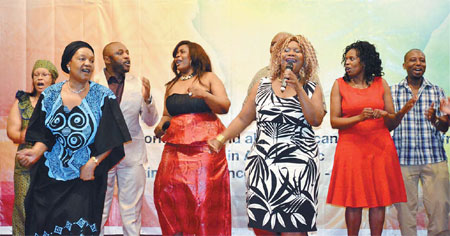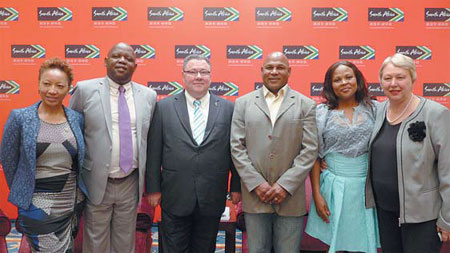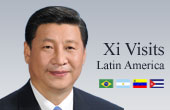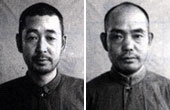Building bridges
By Deng Yajun (China Daily Africa) Updated: 2014-08-01 09:19"If you drive from Johannesburg, in one direction you find a desert, in the other you find a jungle, the habitat is so diverse."
But she insists it is the spirit of its people that plays the central role in its promotion. "The people of South Africa have wonderful qualities," she says, and the FIFA World Cup 2010 proved a showcase event for that.
"What made it such a success were its people. When you come to South Africa, we are the friendliest people who you will ever meet. When you come as a tourist, some of the best experiences you will leave with involve its people."
How does she deliver that message to the Chinese people?
Central to its Beijing mission has been promotion through its nationals working abroad, its "brand ambassadors", as Lefifi calls them, but those unofficial diplomats need training.
Monthly newsletters are sent out to South Africans living abroad, but in China, especially, this network is growing fast given the ongoing rise in numbers of students in the country, many of whom learn to speak very good Chinese.
"These young people are provided with regular materials in Chinese, so that they can talk about the country and its strengths with their Chinese friends," Lefifi says.
Another way of spreading the message is through food.
Last month, BSA hosted a reception at Pinotage, a South African restaurant in the up-market Sanlitun neighborhood of Beijing.
The spotlight was on Lerato Miza, a guest chef from the South African capital Pretoria, who demonstrated some of the best it has to offer in front of a cross-section of international guests.
Her signature dish was red wine and herb infused oxtail with steam bread. "Really nostalgic South African soul food," one guest said.
"The purpose of these kinds of events is to let South Africans in China get excited about their own food, but also to pass their enthusiasm to our guests and friends," Lefifi says.
Tourism links between China and South Africa are already strong and Lefifi is confident they will continue growing.
"China's outbound tourists have just reached 100 million, globally, and we want 10 percent of that market," she says.
"Over the next three to four years, we will be targeting the country's second-tier markets - such as Chengdu, Chongqing, Shenyang - and then the third and fourth-tier markets."
In recent years, deals aplenty have been signed between the countries, from construction and media, to manufacturing factories, wine and food imports.
One of the headline deals landed South African media giant Naspers a 46 percent share in China's Tencent Holdings Ltd in 2001, which has now gone on to become one of the biggest forces on the Internet.
"We are building a lot of relationships in business, trade, foreign direct investment," Lefifi says.
"But we also need to establish greater understanding at a people-to-people level, so developing intercultural relations are crucial in Beijing."
It is this kind of direct, grassroots relationship building that Young African Professionals and Students is trying to grow.
With a mission statement of being the perfect place for mainly young Africans, students and young professionals in China "to network and look for help from each other", it has a rather pastoral feel to how it works.
It was set up to offer young Africans the opportunity to link up with people from their own countries, but its frequent events in Beijing are also "open to anyone interested in Africa".
Gontse Mosi, one of its African members, from South Africa, explains: "Our main aim is we offer direct connections between people, and every member offers help to each other.
"Young African Professionals and Students makes introductions to those who have worked in the same area and also helps on a mentoring level by providing face-to-face discussions with industry leaders and peers.
It organizes regular guest-speaker events, both from Africa originally but also with others who have worked all over the world, including China.
"They tell their stories, and how they learned from their experiences, and how their companies developed.
"Discussions follow, which help these young people decide on how to present an accurate picture of themselves and their countries, to the world."
Mosi believes the main difficulty facing young Africans in China and elsewhere in the world is "cultural division".
He says: "People perhaps don't understand Africa, where we come from, and what we want to do and achieve.
"There is still a misunderstanding that we are just looking for aid, and are poor.
"But we want to show the world what we are capable of doing, and what we have done."
For China Daily
|
Performance in June to celebrate the first anniversary of the launch of Appreciate Africa Network. Provided to China Daily |
|
The South Africa tourism agency has done promotional events in second-tier cities such as Chengdu. Provided to China Daily |
(China Daily Africa Weekly 08/01/2014 page1)












